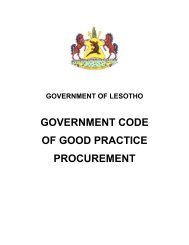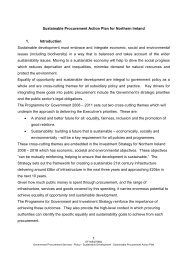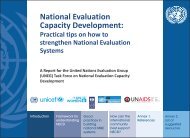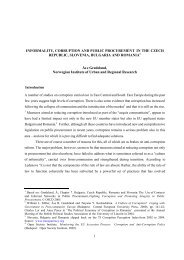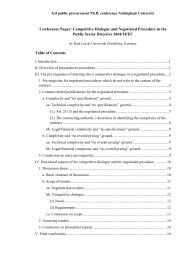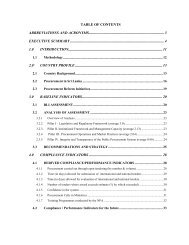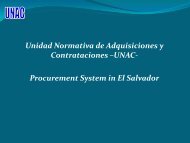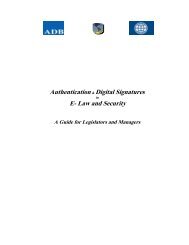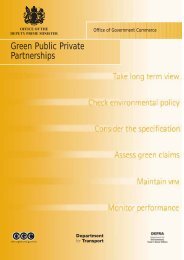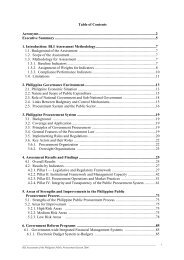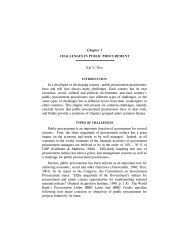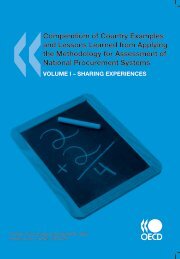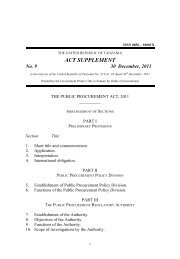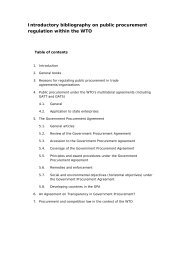The Public Procurement Rules 2008 - LGED
The Public Procurement Rules 2008 - LGED
The Public Procurement Rules 2008 - LGED
You also want an ePaper? Increase the reach of your titles
YUMPU automatically turns print PDFs into web optimized ePapers that Google loves.
consideration.<br />
(3) <strong>The</strong> Evaluation Committee may then engage in confidential and separate discussions,<br />
if necessary, with each of the responsive Tenderers concerning any aspect of their Proposals<br />
except the Tender price and each Tenderer shall maintain the confidentiality of his or her Tender<br />
and shall not reveal any confidential information or ideas to other Tenderers.<br />
(4) At the end of the discussions under Sub-Rule (3), the Evaluation Committee shall<br />
issue Minutes of Tender Adjustments’ to each responsive Tenderer that outlines the changes<br />
required in its Technical Proposal, as agreed with the Procuring Entity for incorporation in the<br />
Second-Stage Tender.<br />
(5) <strong>The</strong> Evaluation Report, including each draft minutes of the adjustments signed by the<br />
concerned Tenderers and all members of the Evaluation Committee, shall be submitted to the<br />
Head of the Procuring Entity or the officer authorized by him or her or the Approving Authority for<br />
review,within the period specified in schedule II.<br />
(6) In case the Approving Authority does not agree with the recommendation in the<br />
Evaluation Report, the matter shall be dealt with in accordance with the provision of Rule 11.<br />
68. <strong>The</strong> Second Stage in the Two-Stage Tendering Method. |— (1) Before launching<br />
the Second-Stage, the Procuring Entity shall revise the Tender Documents to reflect the agreed<br />
new technical scope and set out the detailed tender evaluation criteria for the Second Stage<br />
Tenders.<br />
(2) In revising the Tender documents in the second stage the Procuring Entity shall<br />
maintain the confidentiality of the Tenderers’ Technical Proposals used in the first stage,<br />
consistent with requirements of transparency and intellectual property rights.<br />
(3) All responsive Tenderers from the First-Stage shall be invited to submit their priced<br />
‘best and final’ Tenders, in accordance with the requirements of the Second-Stage Tender<br />
Document and the individual Minutes of Tender Adjustments issued to each Tenderer within the<br />
period specified in Schedule II.<br />
(4) For the Second-Stage, the Procedures for Tender submission, opening, evaluation<br />
and award of the Contract shall follow the same procedures as for Open Tendering Method.<br />
PART – 4<br />
NATIONAL PROCUREMENT- REQUEST FOR QUOTATION METHOD<br />
(Section 32 of the Act)<br />
69. Conditions and Procedures for Use of Request for Quotation Method (RFQ). |—<br />
(1) A Procuring Entity may undertake <strong>Procurement</strong> by means of the RFQ for readily available in<br />
the market standard off-the-shelf Goods and related Services, low value simple Works and<br />
physical Services,<br />
provided that the estimated value of such <strong>Procurement</strong> shall not exceed the threshold<br />
separately specified for revenue and development budget in Schedule II.<br />
(2) <strong>The</strong> Head of the Procuring Entity shall strictly control the use of the RFQ Method in<br />
order to ensure that there is no abuse and that its use by Procuring Entities is restricted to the<br />
items specified in this Rule.<br />
(3) A decision to use RFQ Method shall be approved in writing by the Head of the<br />
Procuring Entity or an officer authorised by him or her unless the RFQ method was scheduled for<br />
59



